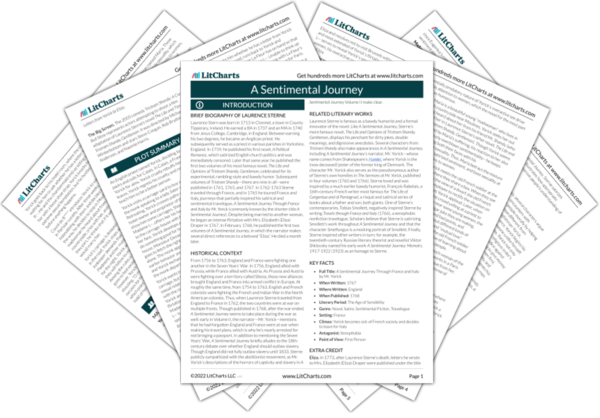Yorick, the narrator of A Sentimental Journey, at one point argues that “nature has so wove her web of kindness, that some threads of love and desire are entangled with the piece”—in other words, kindness often contains mixed motives involving romance and sex, which we cannot remove without damaging our instinct to be kind. The novel largely supports Yorick’s argument—but it also suggests that sexual attraction can lead to unkindness in the form of predatory behavior and infidelity. On the one hand, Yorick tends to be kind to women, due to his sexually tinged esteem for women in general. For example, he pays polite attention to Madame de L— and expresses interest in her suffering, he gives money and advice to Madame de R—’s chambermaid, and he wipes up the scorned madwoman Maria’s tears when she seems in need of human contact and sympathy. These actions show how Yorick’s sexual attraction to women makes him considerate toward them. Yet Yorick’s sexual attraction to women also tempts him toward unkind, even predatory acts. For example, he narrowly resists taking advantage of Madame de R—’s chambermaid, a young woman of a lower social class who is only visiting him on an errand from her employer. Moreover, Yorick has promised his “eternal fidelity” to a woman named Eliza, a promise he seems in constant danger of breaking due to his sexual attraction to other women. In A Sentimental Journey, then, sexuality both motivates Yorick to kindness and tempts him to behave unkindly—it’s a double-edged sword.
Sexuality and Kindness ThemeTracker

Sexuality and Kindness Quotes in A Sentimental Journey
Now where would be the harm, said I to myself, if I was to beg of this distressed lady to accept of half of my chaise?—and what mighty mischief could ensue?

Unlock explanations and citation info for this and every other A Sentimental Journey quote.
Plus so much more...
Get LitCharts A+In saying this, I was making not so much La Fleur’s eloge, as my own, having been in love with one princess or another all my life, and I hope I shall go on so, till I die, being firmly persuaded, that if ever I do a mean action, it must be in some interval betwixt one passion and another: whilst this interregnum lasts, I always perceive my heart locked up—I can scarce find in it, to give Misery a sixpence, and therefore I always get out of it as fast as I can, and the moment I am rekindled, I am all generosity and good will again; and would do any thing in the world either for, or with any one, if they will but satisfy me there is no sin in it.
‘Twas only in the power, says the Fragment, of the God whose empire extendeth from heaven to earth, and even to the depths of the sea, to have done this.
Why should I dissemble the matter? I had sworn to her eternal fidelity—she had a right to my whole heart—to divide my affections was to lessen them—to expose them, was to risk them: where there is risk, there may be loss—and what wilt though have, Yorick! to answer a heart so full of trust and confidence—so good, so gentle and unreproaching?
Surely—surely man! it is not good for thee to sit alone—thou wast made for social intercourse and gentle greetings, and this improvement of our natures from it, I appeal to, as my evidence.
But there is nothing unmixt in this world; and some of the gravest of our divines have carried it so far as to affirm, that enjoyment itself was attended even with a sigh—and that the greatest they knew of, terminated in a general way, in little better than a convulsion.
If nature has so wove her web of kindness, that some threads of love and desire are entangled with the piece—must the whole web be rent in drawing them out?
And does the difference of the time of day at Paris make a difference in the sin?—It made a difference, he said, in the scandal.
I told Madame de V*** it might be her principle; but I was sure it could not be her interest to level the outworks, without which I could not conceive how such a citadel as hers could be defended—that there was not a more dangerous thing in the world, than for a beauty to be a deist—that it was a debt I owed my creed, not to conceal it from her—that I had not been five minutes sat upon the sopha besides her, but I had begun to form designs—and what is it, but the sentiments of religion, and the persuasion they had existed in her breast, which could have check’d them as they rose up.











